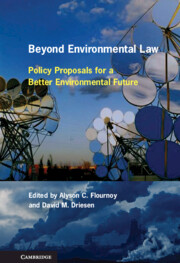Book contents
- Frontmatter
- Contents
- List of Figure and Tables
- About the Contributors
- Preface
- Acknowledgments
- Part I National Environmental Legacy Act
- 1 The Case for the National Environmental Legacy Act
- 2 The Necessity of Procedural Reform
- 3 Shifting Baselines and Backsliding Benchmarks: The Need for the National Environmental Legacy Act to Address the Ecologies of Restoration, Resilience, and Reconciliation
- 4 Valuing Nature: The Challenge of the National Environmental Legacy Act
- 5 Citizen Science and the Next Generation of Environmental Law
- 6 Creating National Environmental Legacy Act Information: The Double Standard
- 7 The Constitution and Our Debt to the Future
- Part II Environmental Competition Statute
- Index
- References
4 - Valuing Nature: The Challenge of the National Environmental Legacy Act
Published online by Cambridge University Press: 05 June 2012
- Frontmatter
- Contents
- List of Figure and Tables
- About the Contributors
- Preface
- Acknowledgments
- Part I National Environmental Legacy Act
- 1 The Case for the National Environmental Legacy Act
- 2 The Necessity of Procedural Reform
- 3 Shifting Baselines and Backsliding Benchmarks: The Need for the National Environmental Legacy Act to Address the Ecologies of Restoration, Resilience, and Reconciliation
- 4 Valuing Nature: The Challenge of the National Environmental Legacy Act
- 5 Citizen Science and the Next Generation of Environmental Law
- 6 Creating National Environmental Legacy Act Information: The Double Standard
- 7 The Constitution and Our Debt to the Future
- Part II Environmental Competition Statute
- Index
- References
Summary
THE PROPOSED NATIONAL ENVIRONMENTAL LEGACY ACT (LEGACY Act or Act) provides an opportunity to achieve sustainable natural resource management. Changing our goals and aspirations for the future to reflect a more sustainable relationship with the environment requires that we look beyond the small scale, self-interest and the short term to the larger scale, the greater good, and the longer term. Important to implementation of the proposed statute is a mechanism to systematically evaluate whether actions affecting public resources will impermissibly degrade or deplete resources over the legacy period. The statute requires the identification of metrics to assess the impacts of proposed actions on a wide array of resources. This chapter proposes embodied-energy (emergy) synthesis as a tool that may provide a useful measure of values embodied in resources that may help to provide a readily quantified metric for use in setting resource baselines and assessing whether impacts will impermissibly degrade or deplete resources.
Emergy accounting is a donor system of value (measuring intrinsic value) based on solar energy required to produce things. This chapter briefly introduces the concepts of emergy synthesis and emergy accounting and describes how these could be employed to perform many important responsibilities under the Legacy Act. It then describes the challenges presented by the Legacy Act related to assessing the values and services provided by public natural resources. The chapter concludes with a more detailed explanation of the underlying methodology and theory of emergy accounting and the advantages of emergy accounting over available alternatives.
- Type
- Chapter
- Information
- Beyond Environmental LawPolicy Proposals for a Better Environmental Future, pp. 81 - 108Publisher: Cambridge University PressPrint publication year: 2010



